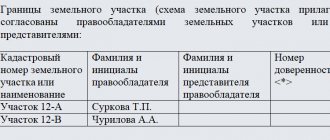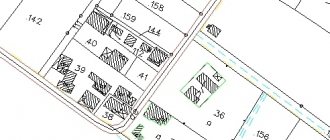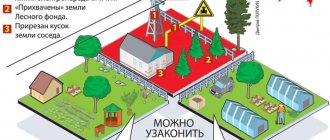The law provides for cases when the owner of a land plot may lose it for one reason or another. Forced seizure of land is allowed only by decision of authorized bodies, one of which is the court.
The state, while providing equal protection for all forms of property, including private property, simultaneously allows for the possibility of its forced seizure.
The following cases of land seizure are known:
- Foreclosing on the debtor's land
- Alienation by force of law
- Requisition
- Confiscation
- Withdrawal for the needs of the state or municipality
- Confiscation of land used in violation of the law
Grounds for forced seizure of land
Grounds for forced seizure of land
What could serve as grounds for your land to be taken away? In most cases, this may not be the intended use, but this applies to a certain category of land called farmland.
In other cases, seizure may occur on the basis of a contract or law. So, for example, for failure to fulfill obligations, the debtor will be liable with all his property, including land on the right of private ownership.
Often, when receiving loans, citizens pledge their property, which may include land. If the loan is not repaid, the bank has the right, on the basis of the loan agreement, to repay the debt at the expense of the value of the land plot by confiscating it and selling it at auction.
The third case may be a state need to use land, both for defense needs and in other cases. However, when land is confiscated by the state, cases of compensation payments are provided.
Confiscation of land from the owner
Seizure procedure
The following sequence of actions during seizure is established:
- The authorized body exercises control over the land plots under its jurisdiction.
- Based on the results of the inspections, the copyright holder receives receipts for payment of the fine and an order to eliminate violations.
- After the period specified in the order has expired, a repeat inspection is carried out.
- If the owner ignores the authorities' demands, the local government prepares a lawsuit in the district court.
- If the decision is positive, the plot is seized and sold at auction.
- The proceeds are transferred to the former owner.
Also on the topic: Cadastral passport of a land plot online
If the exact cadastral value of the plot is unknown, the citizen pays a fine of 10-20 thousand rubles. If it is known, individuals pay 0.5-1% of it. For legal entities, a fine of 1.5-2% of the cadastral value is established, but not less than 100 thousand rubles.
As a result, a plot of land may be confiscated from the owner if he does not use it or uses it for other purposes. To prevent seizure, it is necessary to pay fines and correct the situation. It is important not to bring the case to court.
Types of forced land acquisition
So, let's consider in more detail individual cases of land seizure
Imposition of penalties on a land plot
Foreclosure of land under the obligations of the debtor occurs on the basis of a decision made that has entered into force. If the voluntary decision is not enforceable, then enforcement proceedings are initiated. And collection occurs according to writs of execution by bailiffs
Requisition of land
Requisition is the seizure of land from the owner as a result of emergency situations or natural disasters. The withdrawal is temporary.
The purpose of the seizure is to protect the life and health of citizens, for example, as a result of a disaster at a nuclear power plant, when the land cannot be used and it is necessary to protect the health of citizens living on this land
Confiscation of land from the owner
Confiscation of a land plot is provided for in the case when a citizen commits an illegal act, which can be either criminal or administrative. In both cases, the seizure will occur by court decision
Confiscation of land plots for state and municipal needs
Exemption for the needs of the state or municipality is applied only as an exception. The basis may be an international obligation or the location of federal facilities.
In cases of seizure of land by the state, they are compensated with equal compensation. The terms, amount of compensation and other conditions under which the seizure of a land plot for state or municipal needs is carried out are determined by the agreement on the seizure of the land plot and the real estate located on it.
Confiscation of agricultural land
Judge of the Supreme Court Zh. Kashkinbaeva talks about the procedure for confiscating land for state needs
Forced alienation of property for state needs can be carried out subject to equivalent compensation.
Photo: June 18, 2020, 15:22
The seizure order can be appealed to the court within three months from the day when a citizen or legal entity became aware of a violation of their rights and legitimate interests.
Property law is one of the fundamental branches of both national and foreign legal systems. At one time, the English philosopher John Locke defined the protection of individual property as the main function of political society. Most countries have developed the necessary laws to protect property, including in the field of land and property relations.
From the first years of Kazakhstan's independence, the main attention to private property was focused precisely on the aspect of its protection. The Constitution of the Republic of Kazakhstan stipulates that no one can be deprived of their property, except by a court decision. Forced alienation of property for state needs in exceptional cases provided for by law may be carried out subject to equivalent compensation.
Since March 1, 2011, the Law “On State Property” has been in force, which changed the procedure for the seizure of land for state needs enshrined in the Land Code. Now this law describes in detail the main stages of the process of seizure of land for state needs. In total, there are four key stages in the seizure process. But this does not mean that in every situation requiring land acquisition, all four stages will be involved. It all depends on the circumstances, in particular, whether the owner of the site agrees to the proposed terms of the seizure agreement. But such stages as making a decision on seizure and maintaining the publicity of the forced alienation procedure, as well as discussing a repurchase agreement with the copyright holder must always be present.
The first stage is the adoption of a decree on seizure. The issues of preparing and making a decision on seizure are regulated in detail in Articles 62-63 of the Law “On State Property”. In particular, these norms name the circumstances that allow the adoption of such a resolution, and also list the main elements of this resolution.
Maintaining the publicity of the forced alienation procedure: within 3 working days from the date of adoption of the resolution of the Government of the Republic of Kazakhstan or the local executive body, the authorized body must publish it in the republican or local media. In addition, he must, no later than 3 calendar days after the publication of the resolution, send to the copyright holders of the seized plots and the real estate located on them a written notice of the compulsory alienation of the land plot (by mail with the obligatory receipt of notification of receipt of the postal item).
A notice of forced alienation of a land plot or other real estate in connection with the seizure of a land plot for state needs, as a legal claim, undergoes mandatory state registration in accordance with the Law of the Republic of Kazakhstan “On State Registration of Rights to Real Estate”.
The Law “On State Property” enshrines an important guarantee for the copyright holder: the plot can be seized no earlier than three months from the date of official publication of the resolution. In addition, it is on the date of delivery of the notification to the property owner about the upcoming seizure of the land plot that an independent appraiser determines the market value of the land plot or other real estate in connection with the seizure of the land plot for state needs. Finally, from the moment the notification is received, the period for challenging the seizure order begins.
The seizure order can be appealed to the court within three months from the day when a citizen or legal entity became aware of a violation of their rights and legitimate interests.
The second stage is determining the amount of compensation in connection with the seizure of land plots. Forced seizure of a land plot is permitted subject to equivalent compensation.
The amount of compensation for confiscated plots in accordance with the provisions of the Law “On State Property” depends on the basis for the emergence of rights to the land plot by the owner and land user. Specific grounds for determining the value of a land plot or other real estate are established in Article 67 of the Law.
For example, the value of a land plot alienated for state needs (without taking into account losses) acquired by the owner from the state is determined in the amount paid to the state. In case of incomplete payment of the amount for a land plot (excluding losses) sold by the state in installments, and its withdrawal during forced alienation for state needs, the price is determined in the amount paid to the state.
The cost of a land plot alienated for state needs, provided for individual housing construction, for running personal subsidiary plots (except for field plots), on which an individual residential building is located, is determined in the amount of the value of the land plot and the real estate located on it in an amount not exceeding their market value.
The value of a land plot alienated for state needs, transferred to the owner under a civil law transaction or by a court decision, is determined in the amount of the value specified in the civil law agreement or in the court decision, but not exceeding the market value. If the civil contract does not specify the price for a land plot, the value of the land plot is determined by its cadastral (estimated) value.
In addition, losses are compensated if they occur in connection with forced alienation. If, simultaneously with the confiscation of plots, real estate located on them and belonging to the owners of the plots are confiscated, then their market value is included in the amount of compensation.
There is an alternative to monetary compensation—providing the copyright holder with another plot and (or) property with their value offset against the amount of compensation. Such an alternative can only be used with the consent of the copyright holder.
The third stage is the conclusion of an agreement on the purchase of a land plot. The owner of the seized property or a non-state land user, from the receipt of a written notification within one month, has the right to initiate conciliation procedures by submitting a written appeal to the local executive body. Then, the local executive body is obliged to consider the proposals within one month, for which it appoints an independent assessment of the value of the seized property. Once an agreement is reached, the draft buyout agreement is sent to the local representative body for approval.
If the right holder has not expressed a desire to resolve the issue through a conciliation procedure, the local executive body submits a draft purchase agreement to the relevant local representative body within two months from the moment the owner or non-state land user receives the notification.
A draft agreement on the purchase of a land plot or other real estate is considered by a standing commission of a local representative body no later than two weeks from the date of its submission with the obligatory invitation of the owner and persons whose rights in relation to the alienated property will be terminated or limited.
When an agreement is reached with the right holder, the repurchase agreement must indicate the amount and procedure for payment of the cost of the land plot, compensation for losses, the difference between the price of the seized land plot and the cost of the land plot provided in exchange for the seized one, the deadline for payment of the price (cost), the composition of the property alienated for state needs. The concluded agreement on seizure is the basis for the transfer or termination of ownership of the plot and (or) real estate located on it.
It is necessary to emphasize an important nuance: registration of the termination of the rights of the owner or non-state land user and the emergence of state rights to this property is impossible without providing a document confirming the payment of compensation.
The fourth stage is the forced seizure of the site (if no agreement on seizure has been concluded). If the owner disagrees with the resolution of the Government or local executive body, and (or) does not reach an agreement with him on the value of the property seized for state needs and the amount of losses subject to compensation, after three months from the date of receipt of the notification by the owner or non-state land user, but no later deadline (date) for the implementation of compulsory alienation, determined in the resolution, the local executive body has the right to apply to the court with a claim for compulsory alienation.
A court decision on forced seizure that has entered into legal force is the basis for the onset of legal consequences similar to the consequences of the seizure agreement described above.
Zh. Kashkinbaeva, judge of the Supreme Court of the Republic of Kazakhstan
More news in the Telegram channel “zakon.kz”. Subscribe!
report a bug
Report a bug 4852383-2ef3aa783e445a54872d1f59918c7240
Confiscation of agricultural land
Especially for the protection of agricultural lands, a rule is provided according to which the owners of these lands can lose it for inappropriate use or even for the fact of non-use.
The purpose of providing farmland is to grow agricultural products. If this requirement is violated, for example, the owner erects buildings or structures, then the site is subject to seizure.
Also, for the purpose of priority protection of agricultural land, cases of control over its use are provided. If the owner does not carry out any measures for reclamation, land reclamation or cultivation of agricultural products within three years, then the control authorities have the right to raise the issue of seizure of the land.
In this case, the land comes to the income of the state or municipality.
Conditions and procedure for alienation of land
By voluntarily alienating real estate, the owner of the property exercises his right to freely dispose of this property. In this case, the main basis for the transfer of ownership is concluded transactions - purchase and sale, exchange, will and other transactions.
Also read: Application for notification of the right to property deduction
When alienating plots of land, it is important to take into account the restrictions on their turnover established in land legislation. This applies to certain categories of land that are completely withdrawn from civil circulation (for example, areas on which nature reserves, national parks, civil and military burial grounds and other categories of land are located) or limited in circulation (for example, plots of land included in the forest fund, or dedicated for communication needs).
Grounds for the emergence and termination of ownership of land plots
A citizen or legal entity may renounce ownership of a land plot by declaring this or taking other actions that definitely indicate his removal from ownership, use and disposal of property without the intention of retaining any rights to this property (Article 236 of the Civil Code of the Russian Federation) .
* other circumstances in cases established by federal laws, and in relation to the seizure, including through redemption, of land plots from lands owned by constituent entities of the Russian Federation or municipal property, in cases established by the laws of constituent entities of the Russian Federation.
27 Jun 2020 stopurist 458
Share this post
- Related Posts
- Regulatory Quadrature When Issuing a Young Family Certificate
- Will the lights be turned off if you owe rent?
- From what amount of debt can bailiffs seize real estate?
- What benefits are due at the birth of 3 children?
By forced alienation
Termination of the right of private ownership of a land plot or land use rights is not permitted, except in cases of forced alienation of a land plot for state needs. A land plot may be forcibly alienated for state needs in exceptional cases when it is impossible to satisfy these needs in any other way and subject to equivalent compensation of the property with the consent of the owner or non-state land user or by court decision.
The seizure of a land plot from a state land user for state needs is carried out on the basis of the Resolution of the Government of the Republic of Kazakhstan, a unilateral decision of the executive body carrying out the seizure. According to the requirements of the law, the Astana city akimat compulsory alienation of a land plot for state needs is carried out while maintaining the publicity of the alienation procedure by publishing a resolution in the republican or local media within three working days from the date of its adoption. Failure to comply with the provisions of this article is grounds for the court to refuse the compulsory alienation of a land plot for state needs and to cancel the resolution adopted by the Government of the Republic of Kazakhstan or the local executive body on the start of compulsory alienation. Protection of the rights of persons whose land plot is alienated for state needs is carried out in court. In turn, the owner or non-state land user of the alienated land plot in accordance with this code, after the adoption of a resolution on the start of compulsory alienation of the land plot for state needs, has the right to initiate conciliation procedures in the manner established by Chapter 6 of the Law of the Republic of Kazakhstan “On State Property”.
Also read: Leave for military personnel for living in an area with preferential economic status







